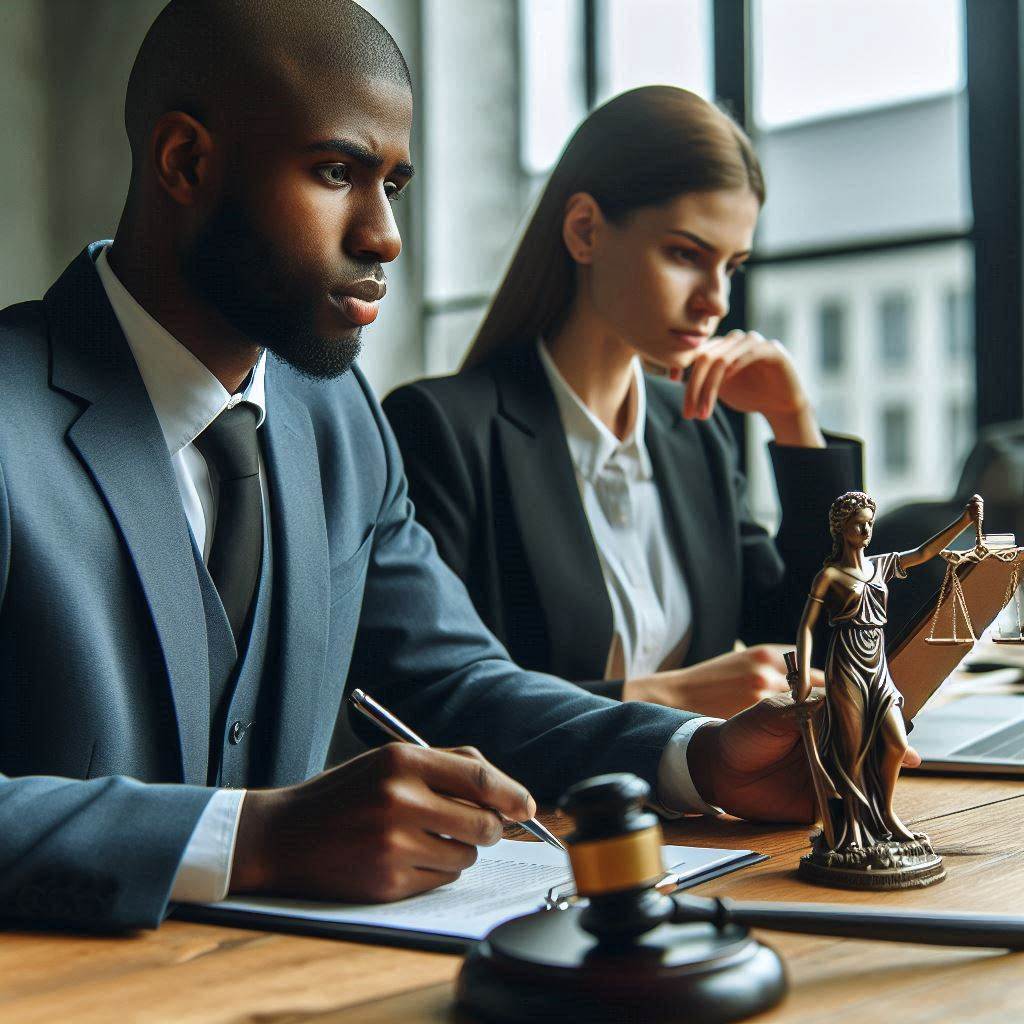Introduction
Legal mediation plays a crucial role in resolving disputes effectively.
It offers an alternative to traditional litigation, emphasizing cooperation and mutual agreement.
Mediation is increasingly important in today’s legal landscape, where court systems are often overwhelmed and litigation costs are high.
Briefly introduce the importance of legal mediation in resolving disputes
Legal mediation provides a valuable means of resolving conflicts outside the courtroom.
It is a cost-effective and time-efficient process.
Mediation helps parties reach mutually acceptable solutions, reducing the emotional and financial strain of prolonged disputes.
By encouraging open communication, mediation fosters understanding and cooperation between conflicting parties.
This process often preserves relationships that litigation might damage, making it especially useful in family, business, and community disputes.
The role of a legal mediator in facilitating communication and negotiation between parties
The legal mediator plays a pivotal role in the mediation process.
Mediators facilitate communication and negotiation between disputing parties.
They create a neutral and supportive environment where parties feel comfortable expressing their concerns.
Mediators guide the conversation, helping parties to understand each other’s perspectives.
They assist in identifying common interests and exploring possible solutions.
By managing the dialogue, mediators prevent conflicts from escalating and keep discussions focused on resolution.
They also ensure that the process remains fair and balanced, giving each party an equal opportunity to voice their views.
In short, legal mediation is essential for resolving disputes efficiently and amicably.
It provides an alternative to litigation that saves time, money, and relationships.
Legal mediators are key to this process, facilitating communication and negotiation to help parties reach mutually beneficial agreements.
Their role ensures that mediation is a fair, effective, and positive experience for all involved.
Understanding the Legal Mediation Process
Legal mediation is a process where a neutral third party, the legal mediator, helps parties in conflict reach a mutually beneficial agreement.
Understanding the steps involved in the legal mediation process is crucial for a successful resolution.
Steps Involved in the Legal Mediation Process
- Introductions and Opening Statements: The legal mediator introduces themselves and explains the mediation process to the parties.
- Issue Identification: The parties present their perspectives and identify the key issues that need to be resolved.
- Exploration of Interests: The legal mediator helps parties explore their underlying interests and concerns.
- Generate Options: The parties brainstorm potential solutions with the guidance of the legal mediator.
- Negotiation: The parties engage in negotiations with the goal of reaching a compromise.
- Agreement: Once an agreement is reached, the parties sign a binding agreement facilitated by the legal mediator.
Role of a Legal Mediator in Helping Parties
A legal mediator plays a crucial role in facilitating communication and ensuring a fair and balanced negotiation process.
They help parties in conflict by:
- Maintaining Neutrality: A legal mediator remains impartial and does not take sides during the mediation process.
- Facilitating Communication: The mediator helps parties communicate effectively and express their concerns.
- Building Trust: Establishing trust between the parties is essential for a successful mediation process.
- Identifying Common Ground: The mediator helps parties find common interests to build upon.
- Managing Emotions: Mediators assist in managing intense emotions and maintaining a constructive atmosphere.
- Empowering Decision Making: Legal mediators empower parties to make their own decisions and reach a mutually acceptable outcome.
Importance of Confidentiality in Legal Mediation
Confidentiality is a fundamental principle of legal mediation that ensures privacy and encourages open communication.
The importance of confidentiality in legal mediation includes:
- Promoting Openness: Parties feel comfortable sharing their concerns and interests without fear of disclosure.
- Building Trust: Confidentiality builds trust between the parties and the mediator, fostering a collaborative environment.
- Encouraging Creativity: Parties can explore creative solutions without the risk of their proposals being used against them.
- Protecting Privacy: Confidentiality safeguards sensitive information and prevents it from being used in court proceedings.
- Enhancing Effectiveness: Maintaining confidentiality enhances the effectiveness of the mediation process by creating a safe space for open dialogue.
Essentially, the key responsibilities of a legal mediator involve understanding the legal mediation process, helping parties reach a mutually beneficial agreement, and upholding the importance of confidentiality.
By following the steps of mediation, assisting parties in conflict resolution, and ensuring confidentiality, legal mediators play a vital role in facilitating successful outcomes in mediation.
Read: Prosecutors’ Role in Sentencing and Appeals
Building Rapport with Parties
The significance of a legal mediator’s ability to establish trust and rapport with conflicting parties
Building rapport with conflicting parties is essential for a legal mediator.
Trust is the foundation of effective mediation.
When parties trust the mediator, they are more likely to engage openly in the process.
Establishing rapport helps mediators understand each party’s perspectives, needs, and concerns.
This understanding is crucial for identifying common ground and facilitating a resolution.
Trust also encourages parties to commit to the agreed-upon solutions, increasing the likelihood of a lasting resolution.
Communication strategies for building rapport with each party
Effective communication strategies are key to building rapport with parties.
Active listening is a crucial skill for mediators.
By listening attentively, mediators show empathy and respect, making parties feel heard and valued.
Open-ended questions encourage parties to share more about their experiences and feelings.
Reflective statements help clarify and validate parties’ emotions and viewpoints.
Maintaining eye contact and using positive body language also contribute to building trust.
Mediators should remain neutral, avoiding judgment or taking sides, which helps maintain their credibility and impartiality.
How a legal mediator creates a safe and non-threatening environment for open dialogue
Creating a safe and non-threatening environment is vital for open dialogue.
Mediators set the tone for respectful and constructive communication.
They establish ground rules that promote courtesy and prevent interruptions.
Confidentiality is emphasized, ensuring parties that their discussions remain private.
Mediators manage the emotional climate by acknowledging and addressing tensions without allowing them to derail the process.
They provide equal opportunities for each party to speak and express their views.
By fostering a supportive atmosphere, mediators enable parties to discuss their issues honestly and work towards a resolution.
All in all, building rapport with conflicting parties is a fundamental responsibility of a legal mediator.
Establishing trust is crucial for effective mediation, as it encourages open communication and commitment to the resolution.
Effective communication strategies, including active listening and reflective statements, help mediators build rapport.
Creating a safe and non-threatening environment is essential for open dialogue, enabling parties to express their concerns and work collaboratively towards a solution.
By mastering these skills, mediators enhance the likelihood of successful and lasting resolutions.
Read: Mentorship Programs for Aspiring Prosecutors
Facilitating Negotiations
The role of a legal mediator in facilitating productive negotiations between parties
A legal mediator plays a crucial role in facilitating productive negotiations.
Mediators guide the discussion, ensuring it remains focused on resolving the conflict.
They help parties communicate their needs and interests clearly.
By managing the negotiation process, mediators prevent discussions from becoming confrontational.
They assist parties in identifying common ground and exploring mutually beneficial solutions.
Mediators ensure that each party has an equal opportunity to contribute, fostering a fair and balanced negotiation environment.
Techniques for managing emotions and maintaining impartiality during negotiations
Managing emotions is essential for successful mediation.
Mediators use techniques to help parties stay calm and focused.
They acknowledge and validate parties’ feelings, which can diffuse tension.
Mediators encourage deep breathing or short breaks when emotions run high.
Maintaining impartiality is equally important.
Mediators must remain neutral and avoid taking sides.
They focus on the process rather than the outcome, ensuring fairness.
Clear guidelines and ground rules help mediators manage emotions and maintain impartiality.
This approach builds trust and keeps negotiations productive.
The importance of active listening and effective communication skills in successful mediation
Active listening is vital for successful mediation.
Mediators listen attentively to understand each party’s perspective.
This helps them identify underlying issues and interests.
Reflective listening, where mediators repeat back what they’ve heard, ensures accuracy and builds trust.
Effective communication skills are also crucial.
Mediators use clear, concise language to convey their points.
They ask open-ended questions to encourage dialogue.
Mediators help parties articulate their needs and concerns constructively.
By fostering open communication, mediators facilitate a collaborative problem-solving process.
Overall, facilitating negotiations is a key responsibility of a legal mediator.
Mediators guide discussions to ensure productive and focused negotiations.
Techniques for managing emotions and maintaining impartiality are essential for successful mediation.
Active listening and effective communication skills are vital for understanding parties’ perspectives and fostering cooperation.
By mastering these skills, mediators enhance the likelihood of reaching mutually beneficial resolutions.
Read: Public Perception and Trust in Prosecutors

Drafting Agreements
When it comes to drafting agreements, a legal mediator plays a crucial role in helping parties reach a mutually beneficial solution.
Here is how they assist in this process:
Understanding Parties’ Needs and Interests
First and foremost, a legal mediator listens to each party’s needs and interests to ensure that the agreement addresses their specific concerns.
By understanding what is important to each party, the mediator can help craft a customized agreement.
Facilitating Communication and Negotiation
The mediator acts as a neutral third party who facilitates communication between the parties.
They help brainstorm potential solutions and assist in negotiating the terms of the agreement. By fostering open dialogue, the mediator helps parties find common ground.
Providing Legal Guidance
A legal mediator has a solid understanding of the legal framework surrounding the dispute.
They can provide legal information and guidance to ensure that the agreement complies with relevant laws and regulations.
This helps parties make informed decisions during the negotiation process.
Transform Your Career Today
Unlock a personalized career strategy that drives real results. Get tailored advice and a roadmap designed just for you.
Start NowReviewing and Finalizing Mediated Agreements
After the parties have reached an agreement, the legal mediator reviews the draft to ensure that it accurately reflects the terms discussed.
They make sure that all parties are satisfied with the agreement before finalizing it.
This step is crucial to avoid any misunderstandings in the future.
Ensuring Enforceability and Clarity of Agreements
One of the key responsibilities of a legal mediator is to ensure that the agreements reached are enforceable and clear.
They draft the agreement in a language that is easily understood by all parties involved and make sure that the terms are specific and unambiguous.
This clarity helps prevent potential disputes down the line.
By assisting parties in drafting agreements that meet their needs and interests, legal mediators play a vital role in resolving disputes amicably and effectively.
Read: Prosecutor Salaries: What to Expect in This Career
Managing Conflict and Power Imbalance
Mediation is a valuable tool for resolving disputes amicably, but it comes with its own set of challenges.
One of the key responsibilities of a legal mediator is to manage conflict and power imbalances effectively during the mediation process.
Conflict can arise due to differences in opinions, values, or goals between parties involved in a dispute.
Power imbalances, on the other hand, refer to disparities in authority, resources, or bargaining power that can affect the dynamics of a negotiation.
Challenges of managing conflict and power imbalances
- Emotions: Strong emotions can hinder productive communication and problem-solving.
- Communication barriers: Misunderstandings or lack of effective communication can escalate conflict.
- Power differentials: Parties with unequal power can feel marginalized or exploited.
Legal mediators play a crucial role in addressing these challenges and creating a balanced and fair environment for all parties involved in the mediation process.
Strategies for addressing power dynamics
- Establish ground rules: Setting clear guidelines for behavior and communication can help create a level playing field.
- Encourage participation: Allowing each party to speak and be heard can empower those with less power.
- Facilitate negotiation: Help parties find common ground and explore mutually beneficial solutions.
By implementing these strategies, a legal mediator can ensure that power differentials are minimized and all parties have an equal opportunity to participate in the mediation process.
Role of a legal mediator in promoting constructive communication
- Active listening: Paying attention to each party’s perspective and validating their feelings can facilitate open communication.
- Neutral facilitation: Remaining impartial and unbiased to encourage trust and cooperation among parties.
- Managing emotions: Helping parties regulate their emotions and stay focused on problem-solving can reduce conflict escalation.
Through effective communication and conflict resolution skills, a legal mediator can foster a collaborative environment where parties can engage in productive discussions and work towards mutually acceptable solutions.
In a nutshell, managing conflict and power imbalances is a critical aspect of a legal mediator’s role.
By employing strategies to address power dynamics, promote constructive communication, and reduce conflict escalation, mediators can help parties reach agreements that are fair and sustainable.
Ensuring Compliance with Ethical Standards
The ethical considerations and responsibilities of a legal mediator
Legal mediators have crucial ethical responsibilities.
They must navigate complex situations while upholding the highest ethical standards.
Ethical considerations include maintaining impartiality, confidentiality, and honesty throughout the mediation process.
Mediators must ensure fairness and equality, giving each party an equal voice.
They must avoid conflicts of interest and disclose any potential biases.
Mediators are responsible for creating an environment where parties feel safe and respected.
The importance of maintaining neutrality, confidentiality, and honesty in mediation
Maintaining neutrality is vital for a legal mediator.
Mediators must not favor any party or appear biased.
Neutrality fosters trust and confidence in the mediation process.
Confidentiality is equally important.
Mediators must keep all information shared during mediation private.
This confidentiality encourages parties to communicate openly and honestly.
Honesty from the mediator ensures transparency and integrity in the process.
Mediators must provide accurate information and avoid misleading parties.
Together, neutrality, confidentiality, and honesty build a foundation of trust, essential for effective mediation.
The professional standards and guidelines that legal mediators adhere to
Legal mediators adhere to strict professional standards and guidelines.
Organizations like the American Bar Association (ABA) and the Association for Conflict Resolution (ACR) set these standards.
Mediators must complete accredited training programs and obtain certification.
They follow codes of conduct that outline ethical responsibilities.
Continuous education is required to stay updated on best practices and ethical guidelines.
Mediators must also participate in peer reviews and supervision to ensure compliance with professional standards.
These guidelines ensure mediators provide high-quality, ethical services.
In essence, ensuring compliance with ethical standards is a key responsibility of legal mediators.
Ethical considerations include maintaining impartiality, confidentiality, and honesty.
These principles are crucial for building trust and facilitating effective mediation.
Legal mediators adhere to professional standards set by organizations like the ABA and ACR.
By upholding these standards, mediators provide reliable, ethical, and effective mediation services.
Conclusion
Legal mediators play a crucial role in resolving disputes by facilitating communication between parties.
One key responsibility is to remain neutral and not take sides, ensuring fairness in the mediation process.
Legal mediators must listen actively to each party’s perspective and help them understand each other’s point of view.
They should identify underlying issues and interests to find creative solutions that benefit all parties involved.
Another important aspect is maintaining confidentiality to create a safe and trusting environment for open dialogue.
Legal mediators guide parties through negotiations, encouraging compromise and ensuring mutual respect throughout the process.
They help parties draft agreements that are legally binding and enforceable, detailing the terms of their resolution.
In closing, the key responsibilities of a legal mediator include neutrality, active listening, confidentiality, and guiding parties to find mutual agreements.
Legal mediation is essential in resolving disputes peacefully and promoting understanding between conflicting parties.
Transform Your Career Today
Unlock a personalized career strategy that drives real results. Get tailored advice and a roadmap designed just for you.
Start NowReaders are encouraged to consider the benefits of legal mediation in their own conflict resolution processes for a more amicable outcome.
[E-Books for Sale]
The Big Book of 500 High-Paying Jobs in America: Unlock Your Earning Potential
$19.99 • 500 High-Paying Jobs • 330 pages
Explore 500 high-paying jobs in America and learn how to boost your career, earn more, and achieve success!
See All 500 High-Paying Jobs of this E-Book
1001 Professions Without a Degree: High-Paying American Jobs You Can Start Now
$19.99 • 1001 Professions Without a Degree • 174 pages
Discover 1001 high-paying jobs without a degree! Unlock career tips, skills, and success strategies for just $19.99!




